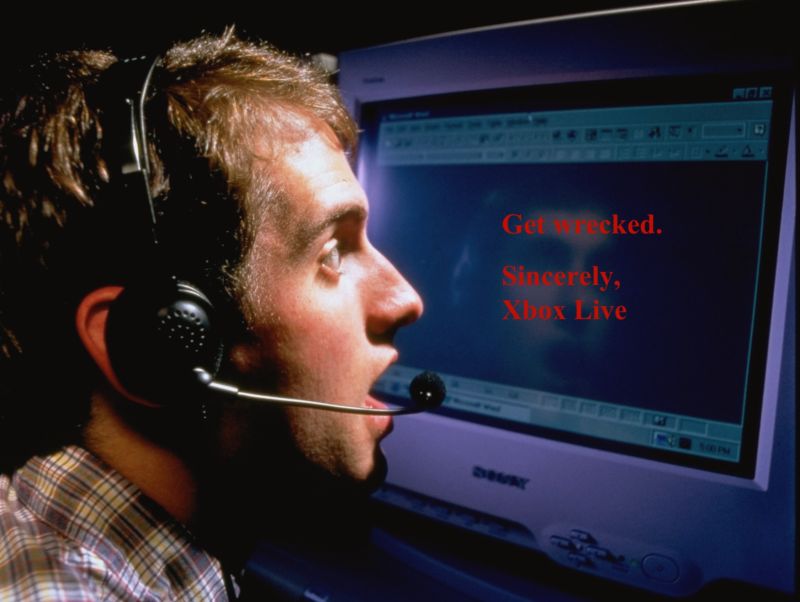
An apparently new page at the official Xbox website, dubbed “Community Standards for Xbox,” was recently unearthed by members of the ResetEra gaming forums. The page appears to be the first of its kind from a console online-gaming provider, as it translates the legalese of Microsoft’s existing “services agreement” to straight-up “l33t” speak.
The page, which has yet to see a signal-boost from Xbox representatives like Phil Spencer or Larry “Major Nelson” Hyrb, goes into detail about 10 major points in Microsoft’s Services Agreement—the form you must scroll through and click “accept” on when creating any Xbox or Microsoft account. These 10 points have been rephrased slightly to better reflect an Xbox use case and are followed by examples of hypothetical activities, including smack talk.
The most notable section may be the “keep your content clean” category. In Microsoft’s official agreement, this is described as follows:
Don’t publicly display or use the Services to share inappropriate content or material (involving, for example, nudity, bestiality, pornography, offensive language, graphic violence, or criminal activity).
The Xbox Community Standards page breaks this down into a few more discretely defined categories, and one of these is titled, “know the difference between trash talk and harassment.” It includes an acknowledgement that “a little trash talk is an expected part of competitive multiplayer action,” then clarifies: “hate has no place here.”
A dictionary-like description of harassment offers examples such as “negative behavior that’s personalized, disruptive, or likely to make someone feel unwelcome or unsafe” and is written in an “includes but is not limited to” way. The standards page then offers five examples of acceptable in-game trash talk, each seemingly plucked from a popular online-gaming genre like FPS and racing, then later tweaks each into an unacceptable version.
The nice list:
- Get destroyed. Can’t believe you thought you were on my level.
- That was some serious potato aim. Get wrecked.
- Only reason you went positive was you spent all game camping. Try again, kid.
- Cheap win. Come at me when you can actually drive without running cars off the road.
- That sucked. Get good and then come back when your k/d’s over 1.
And the naughty list:
- Get <sexual threat>. Can’t believe you thought you were on my level.
- Hey <profanity>, that was some serious potato aim. Get wrecked, trash.
- Only reason you went positive was you spent all game camping. KYS, kid.
- Cheap win. Totally expected from a <racial slur>.
- You suck. Get out of my country—maybe they’ll let you back in when your k/d’s over 1.
(Before you go fragging the messenger—yes, yes, we know, “get rekt” is the standard online spelling of that phrase.)
No more loot caves?!
As the document is pretty long, we’re not going to list it beat-by-beat, other than to point out a few notable points in the document. They may not seem all that new to Terms-of-Service veterans, but Xbox has listed them a bit more discretely in this document.
A section on “harmful behavior” goes into great detail about cheats and exploits. But it also includes a warning for “using ‘mods’ that are not explicitly supported by a game developer,” which is a wide net that could include actions like unlocking keyboard-and-mouse support in an Xbox game that doesn’t formally support it and “using exploits to ‘duplicate’ in-game items,” which many players could consider nothing more than taking advantage of a developer’s buggy code to tap into PvE perks like Destiny 1‘s famous “loot cave.”
A “fraud” section explicitly prohibits “charging another player to help them complete a level in a game,” which could put a wrench in the works of “online companion” services that offer such paid pro-gamer help. Meanwhile, the “keep your content clean” section includes a request that players not “use your activity feed as a platform to promote controversial politics”—which could lead to trolls mass-reporting any phrases relating to women, people of color, or the LGBTQ community.
The document concludes with a reminder of what happens to accounts with repeat infractions: “Under permanent suspension, the owner of the suspended profile forfeits all licenses for games and other content, Gold membership time, and Microsoft account balances.” This kind of suspension doesn’t appear to restrict access to Xbox’s disc-based games.
Update: Shortly after this article went live, a Microsoft representative provided the following statement to Ars Technica: “Community Standards for Xbox, which launched on April 30, makes it easier to understand what kind of behavior is acceptable on Xbox Live and what is not, and how to positively contribute to the global Xbox community to ensure it is safe, welcoming and inclusive of everyone. The standards are not a new set of rules, but are a call to action that empowers every player to evaluate their behavior and adjust accordingly in order to be a force for good.”
https://arstechnica.com/?p=1499615

